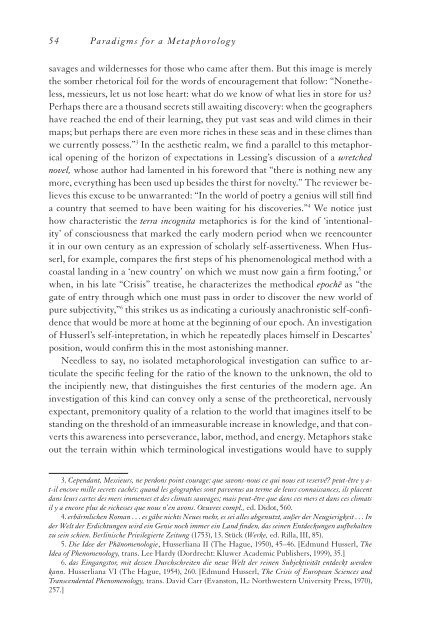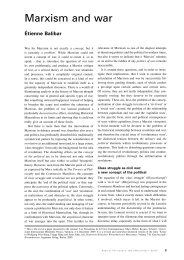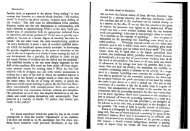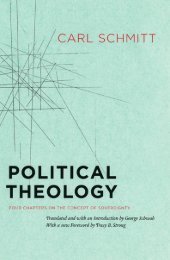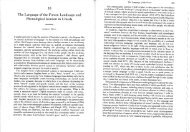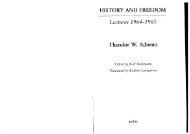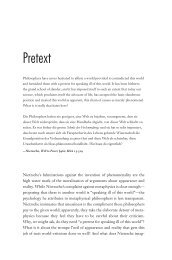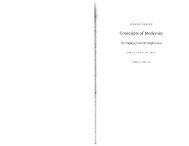Paradigms for a metaphorology.pdf - Townsend Humanities Lab
Paradigms for a metaphorology.pdf - Townsend Humanities Lab
Paradigms for a metaphorology.pdf - Townsend Humanities Lab
You also want an ePaper? Increase the reach of your titles
YUMPU automatically turns print PDFs into web optimized ePapers that Google loves.
54 <strong>Paradigms</strong> <strong>for</strong> a Metaphorology<br />
savages and wildernesses <strong>for</strong> those who came after them. But this image is merely<br />
the somber rhetorical foil <strong>for</strong> the words of encouragement that follow: “Nonetheless,<br />
messieurs, let us not lose heart: what do we know of what lies in store <strong>for</strong> us?<br />
Perhaps there are a thousand secrets still awaiting discovery: when the geographers<br />
have reached the end of their learning, they put vast seas and wild climes in their<br />
maps; but perhaps there are even more riches in these seas and in these climes than<br />
we currently possess.” 3 In the aesthetic realm, we find a parallel to this metaphorical<br />
opening of the horizon of expectations in Lessing’s discussion of a wretched<br />
novel, whose author had lamented in his <strong>for</strong>eword that “there is nothing new any<br />
more, everything has been used up besides the thirst <strong>for</strong> novelty.” The reviewer believes<br />
this excuse to be unwarranted: “In the world of poetry a genius will still find<br />
a country that seemed to have been waiting <strong>for</strong> his discoveries.” 4 We notice just<br />
how characteristic the terra incognita metaphorics is <strong>for</strong> the kind of ‘intentionality’<br />
of consciousness that marked the early modern period when we reencounter<br />
it in our own century as an expression of scholarly self-assertiveness. When Husserl,<br />
<strong>for</strong> example, compares the first steps of his phenomenological method with a<br />
coastal landing in a ‘new country’ on which we must now gain a firm footing, 5 or<br />
when, in his late “Crisis” treatise, he characterizes the methodical epochē as “the<br />
gate of entry through which one must pass in order to discover the new world of<br />
pure subjectivity,” 6 this strikes us as indicating a curiously anachronistic self-confidence<br />
that would be more at home at the beginning of our epoch. An investigation<br />
of Husserl’s self-intepretation, in which he repeatedly places himself in Descartes’<br />
position, would confirm this in the most astonishing manner.<br />
Needless to say, no isolated metaphorological investigation can suffice to articulate<br />
the specific feeling <strong>for</strong> the ratio of the known to the unknown, the old to<br />
the incipiently new, that distinguishes the first centuries of the modern age. An<br />
investigation of this kind can convey only a sense of the pretheoretical, nervously<br />
expectant, premonitory quality of a relation to the world that imagines itself to be<br />
standing on the threshold of an immeasurable increase in knowledge, and that converts<br />
this awareness into perseverance, labor, method, and energy. Metaphors stake<br />
out the terrain within which terminological investigations would have to supply<br />
3. Cependant, Messieurs, ne perdons point courage: que savons-nous ce qui nous est reservé? peut-être y at-il<br />
encore mille secrets cachés: quand les géographes sont parvenus au terme de leurs connaissances, ils placent<br />
dans leurs cartes des mers immenses et des climats sauvages; mais peut-être que dans ces mers et dans ces climats<br />
il y a encore plus de richesses que nous n’en avons. Oeuvres compl., ed. Didot, 560.<br />
4. erbärmlichen Roman . . . es gäbe nichts Neues mehr, es sei alles abgenutzt, außer der Neugierigkeit . . . In<br />
der Welt der Erdichtungen wird ein Genie noch immer ein Land finden, das seinen Entdeckungen aufbehalten<br />
zu sein schien. Berlinische Privilegierte Zeitung (1753), 13. Stück (Werke, ed. Rilla, III, 85).<br />
5. Die Idee der Phänomenologie, Husserliana II (The Hague, 1950), 45–46. [Edmund Husserl, The<br />
Idea of Phenomenology, trans. Lee Hardy (Dordrecht: Kluwer Academic Publishers, 1999), 35.]<br />
6. das Eingangstor, mit dessen Durchschreiten die neue Welt der reinen Subjektivität entdeckt werden<br />
kann. Husserliana VI (The Hague, 1954), 260. [Edmund Husserl, The Crisis of European Sciences and<br />
Transcendental Phenomenology, trans. David Carr (Evanston, IL: Northwestern University Press, 1970),<br />
257.]


